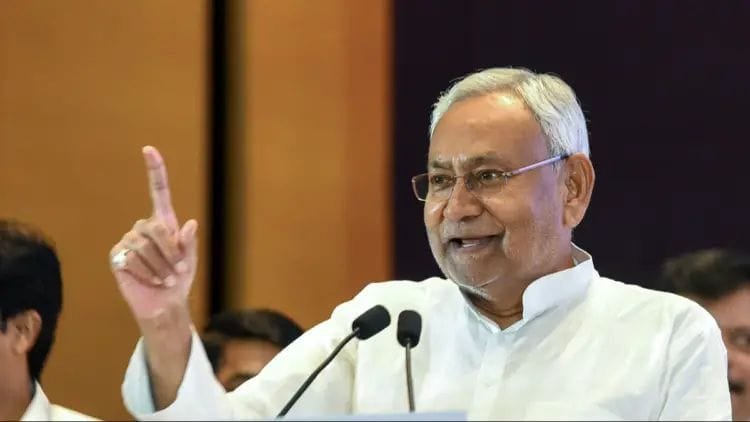Bihar chief minister Nitish Kumar may not be entirely convinced about the BJP-led Centre’s intent behind implementing 33 per cent reservation for women in the Lok Sabha and state assemblies.
Regardless of that, Nitish has supported the bill, which has been passed by both houses of Parliament.
Those who know Nitish from close quarters believe his support for women’s reservation is a logical extension of women being at the core of his governance model. “Like the women’s reservation bill extends the quota to seats reserved for SCs/STs, it should also be extended to women from Other Backward Classes (OBCs) and Extremely Backward Castes (EBCs). But the Centre has delayed the census, which is why there will be a delay,” said the chief minister.
Had Census 2021 been completed, reservation for OBC and EBC women could have been implemented immediately. Only then, Nitish argues, will women’s reservation ensure their empowerment in the true sense. Nitish knows that reservation for women will take place only after completion of the delimitation exercise based on the first census conducted after the passage of the bill. This means women’s reservation, as proposed in the bill, may not come into effect before the 2029 Lok Sabha polls.
But despite these strings attached, if the Bihar CM still backs the women’s reservation bill, it is owing to his strong belief in gender equality and empowerment of women across the board. “If you go into Nitish Kumar’s record as Bihar chief minister, you will find how he has always prioritised women’s empowerment as the core of his governance initiatives,” said Rajiv Ranjan Prasad, national secretary of the Janata Dal (United).
Prasad cites some examples. “Take prohibition. The chief minister knew his government would suffer an annual revenue loss of over Rs 5,000 crore when he enforced prohibition in 2016. Yet, he did it to ensure happier women and a healthier Bihar. Also, it was his idea to form self-help groups for 13 million women, known as Jeevika Didis, in the state, which has provided them income opportunities, and more importantly, have decision-making power in their households. All this has socially and economically empowered women,” he said.
Nitish’s pro-women policies have been evident from the time he took over as Bihar CM for his first full term in November 2005. Within months, Bihar became the first state to reserve 50 per cent seats in panchayats for women. The rest of the country followed suit and at present, 20 states have 50 per cent reservation for women in panchayats. Apart from breaking social shackles and having more women in leadership positions at the grassroots, the decision somewhat helped women gain significant voice and influence in Bihar’s rural power structure.
The impact is seen in various spheres. For instance, the proportion of women voting in Bihar jumped from less than 45 per cent in 2005 to nearly 60 per cent in the 2020 assembly polls.
Over the years, Nitish has extended his women’s empowerment initiatives to other areas as well. Women are being given 50 per cent reservation in primary teacher recruitment. Also, 35 per cent reservation has been offered to women in all government jobs in Bihar.
A massive impact of this policy is visible in the state police. According to a report published by the Bureau of Police Research and Development, as on January 1, 2020, women accounted for 25.3 per cent of the police strength in Bihar, the highest among all states and more than double the national average (10.3 per cent). This is a significant jump from 2015, when women accounted for just 3.3 per cent of the police force in Bihar. Now, one in every four police personnel in the state is a woman. In fact, the effective reservation for women is 38 per cent, as it also includes 3 per cent reservation given to women from the backward castes.
The Nitish government has also reserved 33 per cent seats for girls in institutions under medical, engineering and sports universities, a first in India.
Over the years, Nitish’s efforts have created a silent and caste-neutral constituency of women in Bihar. If the 2020 assembly polls saw the resurrection of the Rashtriya Janata Dal (RJD) through their famous Muslim-Yadav (MY) support base and matching success of the BJP on the Hindutva plank, women still considered Nitish the most preferred leader of Bihar. In fact, a Lokniti-CSDS opinion poll conducted for INDIA TODAY in the run-up to the Bihar assembly polls in 2020 said the Nitish-led alliance’s gender advantage over opponents was unmistakably clear.
With just months to go for the Lok Sabha polls, Nitish, the astute political analyst that he is, has linked caste census to the women’s reservation issue. Incidentally, the caste-based headcount initiated by the Nitish government in Bihar has been completed and the results are likely to be placed in public domain soon.
Now, by linking this with the women’s reservation issue, Nitish has given it a masterful political spin. Clearly, a quantifiable caste data will not just provide statistical rationale to expand the caste-based affirmative action. As Nitish has argued, a caste census can ensure real political empowerment of women-an aim of the women’s reservation bill as well. Having already rejected the caste census idea, the BJP is still not able to offer a response to Nitish’s argument of linking the women’s reservation issue with caste census.

See Insights and Ads
Like
Comment
Share






